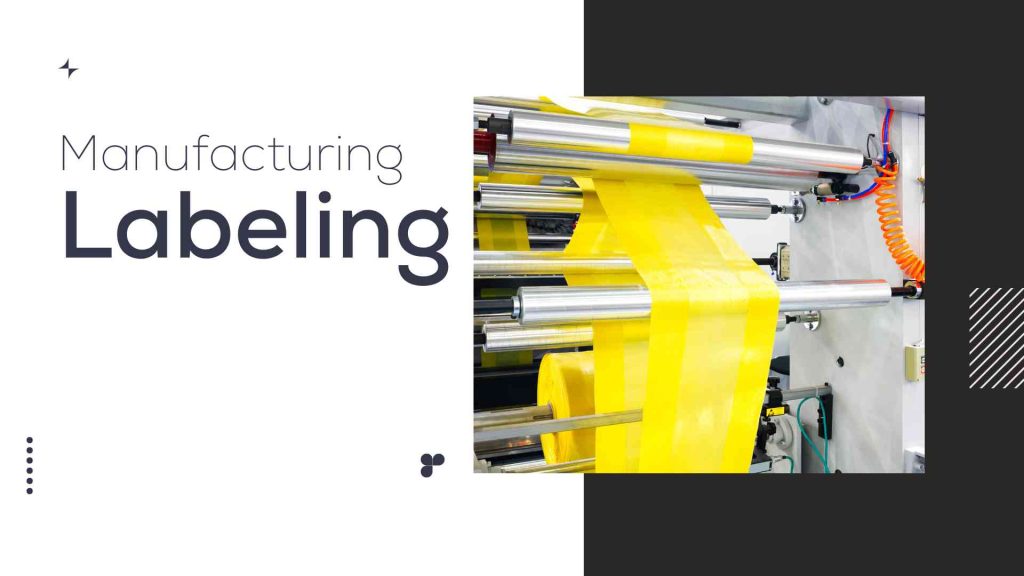As a manufacturer, labels are one of many areas that must be considered. But as you know, they can be crucial in identifying the products you distribute to customers. Labels can help businesses enhance productivity and improve relationships with trading partners while also helping to solve compliance challenges.
One seemingly small but crucial aspect is labeling. Manufacturing labeling is pivotal in ensuring seamless operations, enhancing traceability, and complying with regulations. Whether identifying components, tracking products, or conveying important information, industrial labeling is the silent yet indispensable thread that binds the entire manufacturing process.
Manufacturing processes encompass various industries, from automotive and electronics to food and pharmaceuticals. Regardless of the sector, the significance of clear and accurate labeling remains consistent. This article delves into industrial labeling, exploring essential tips and best practices to streamline operations, minimize errors, and promote overall success.
What is manufacturing labeling?
Labels are found attached to materials, parts, and products; they can be attached with a tag or printed directly onto an item. Labels include information about the product and consumer information in multiple languages, tracking information, QR codes, or barcodes. An effective label conveys important data that helps the supply chain understand what they are dealing with, whether they are handling the item in a warehouse, factory, distribution center, or retail outlet.
What are the four types of labeling?
Companies and small businesses use four major types of labels for their products and operations: brand labels, informative labels, descriptive labels, and grade labels.
The Importance of Effective Manufacturing Labeling
Timely and accurate labeling can reduce production and warehousing time. It enables items to be identified quickly and accurately, allowing them to be processed faster. Labeling also helps by enabling any questionable materials or parts to be easily segregated for testing.
Imagine a manufacturing facility where components, products, and materials are scattered without a proper labeling system. Chaos would undoubtedly ensue. Manufacturing labeling is the backbone of organization and efficiency in a factory setting. It helps workers identify and locate items swiftly and reduces the chances of mistakes leading to costly rework or recalls.
Moreover, as the global marketplace becomes increasingly interconnected, the need for traceability grows more critical. Proper labeling enables manufacturers to track the journey of a product from raw materials to the end consumer. It is crucial for quality control, meeting regulatory requirements, and responding swiftly to any issues.
Industrial Labeling Tips & Best Practices
Standardization is Key
Establishing standardized labeling procedures across your manufacturing facility is the first step toward consistency and clarity. Whether it’s font types, font sizes, colors, or label placement, maintaining uniformity enhances readability and reduces confusion among workers.
Choose the Right Materials
Manufacturing environments can be harsh, with extreme temperatures, chemicals, and mechanical stress exposure. Selecting durable label materials that can withstand these conditions is essential. Polyester, polypropylene, and vinyl are famous for their durability and resistance.
Utilize Barcoding and RFID
Incorporating barcodes or radio-frequency identification (RFID) technology into your labels can significantly boost efficiency. Barcodes enable quick data capture, reducing manual data entry errors, while RFID allows for real-time tracking and information retrieval.
Prioritize Clarity of Information
Ensure that the information on the label is clear, concise, and easily understandable. Include details such as part numbers, batch or lot numbers, manufacturing dates, and safety instructions. Ambiguity in labeling can lead to confusion and mistakes.
Regular Maintenance and Inspection
Labels are subjected to wear and tear over time. Regularly inspect and replace damaged or faded labels to maintain accuracy and prevent errors.
Stay Compliant
Different industries have varying labeling regulations and standards. Stay up-to-date with relevant laws, such as those imposed by the FDA or ISO, to ensure your labeling practices remain compliant.
Employee Training
Train your workforce on the importance of proper labeling procedures. Employees are more likely to adhere to labeling guidelines, reducing errors and improving efficiency.
Integration with Manufacturing Software
Integrate your labeling process with your manufacturing software or Enterprise Resource Planning (ERP) system. This integration can automate data entry, reduce manual work, and enhance accuracy.
Test and Validate Labels
Conduct thorough testing before implementing a new labeling system to ensure labels remain readable and intact throughout manufacturing. Consider factors such as adhesion, readability, and resistance to environmental factors.
Continuous Improvement
Regularly evaluate your labeling processes and gather feedback from employees. Use this information to identify areas for improvement and implement changes that enhance labeling efficiency and accuracy.
It’s about creating a streamlined system that promotes organization, traceability, and compliance. Manufacturers can elevate their labeling processes to new heights, resulting in enhanced efficiency, reduced errors, and a stronger foundation for success in the competitive industrial landscape.
Acumatica’s robust ERP platform seamlessly integrates with manufacturing labeling processes, bridging the gap between accurate labeling and efficient operations. Through real-time data synchronization, automation of labeling tasks, and integration with production workflows, Acumatica ERP enhances manufacturing labeling by minimizing manual errors, ensuring compliance, and optimizing overall productivity.
Acumatica ERP empowers manufacturers to achieve greater control, visibility, and collaboration across the production and labeling processes. By combining the power of effective labeling practices with the technological prowess of Acumatica ERP, manufacturers can confidently navigate the challenges of the modern manufacturing landscape and position themselves for sustained success in the future. Contact us for a customized ERP.

Vijay comes with a vast experience in ERP and enterprise solutions space with about 20 years of experience in various packaged application like Acumatica, SAP, Orion, Salesforce.com, SugarCRM and, SalesLogix.

